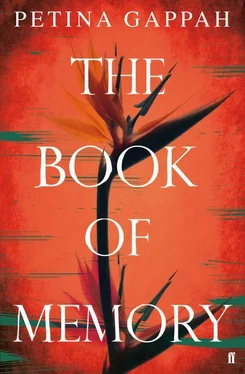From what I have described of the prison, it is probably hard for you to believe that things were much worse here once. There was a cholera epidemic the year before I arrived. Ten women died. It could have been more but the women are not packed as tightly as the prisoners in the men’s section. Still, we are so much on top of each other here that I sometimes forget that there are just over a thousand women in prisons in all of the country. There are some open prisons, and some in Shurugwi. The men are just over twenty thousand, with almost two-thirds of them crammed into Chikurubi.
Every time there is a death from their section, we hear the voices of the men rising in the night to sing away the dead. Loveness says in the cholera days they did nothing but sing, in the day, in the night, all through the months until finally the cholera died out.
I wonder if the first prisons in the country were called penitentiaries, as they were called in England, which gave us prisons along with the rest of our penal system. This is one of those things that Lloyd would have known. The Victorians founded Rhodesia, bringing with them their rigid view of religion, in which there was no difference between a crime and sin; either one meant damnation. They would have seen jails as places of penitence, where sinners and criminals, being so close together, would make their peace with their maker.
In America you call them correctional facilities, as though the buildings are factories and the inmates within so many faulty bottle caps needing to be mended. ‘Jere’, ‘tirongo’, ‘college’ are the slang terms for prison. Nothing suggesting rehabilitation, just being shut away, exile.
Synodia would have been at home in the world of the penitentiary. She has found a new form of tyranny. She now belongs to a church of the type that my mother attended just before she sold me. It is a Pentecostal church called, of all things, the Church of God, headed by a man who calls himself Evangelist Ishmael.
You probably know more about him than I do, but from what the papers say, he draws huge crowds to his services, where he performs cures. The lame walk. The blind are healed. The overweight experience instant weight loss. The short gain centimetres. I read in the paper last week that he has paid for doctors to perform eye surgery on people with cataracts. Considering that he claims to have the power to heal without medical intervention, I would have thought that it was cheaper to place healing hands than do the surgery, but what do I know.
It is not enough that Synodia’s own salvation is secure: she wants to save us all, too. But first, she wants us to know the full extent of our own damnation. She insists that we attend a morning service on every day that she is on duty. Being saved is enough to give her absolute authority not only to interpret the Bible, but also to tell us how we are all to be judged. Who will protest that the prison is state territory, that she should keep her private views to herself?
The separation between Church and State is as foreign to Synodia as her own natural hair. She makes us stand and sing every morning before breakfast. Then she gives a little sermon, and all the while flies are hovering over our bread and the tea grows cold. The sweat shines off her face as she makes authoritative pronouncements about the fate that awaits each of us. She taps the side of her head with an open palm and her fingers splayed upwards as she talks — I suspect that it is not the passion that moves her, but her scalp that itches under her weave. ‘You are whores and murderers; you are thieves and criminals. You have forfeited the Mercy of the Lord, and you will never know the grace of God.’
We have learned the expected responses.
‘That’s right,’ we respond.
‘That’s right!’ screams Evernice, louder than anyone.
‘Are you listening to me? Are you with me? You will burn in hell, all of you.’
‘Amen,’ we agree.
‘Only through the blood of Jesus will you know salvation.’
‘Hallelujah.’
‘You must open your hearts to the Lord. You must fill your blood with his power, so that even the mosquitoes that bite feel that power. They will suck the power in your blood.’
‘Power in the blood!’ echoes Evernice.
‘Kamasatalaha, kamasatalaha, kamasatalaha.’ This is Benhilda Makoni’s contribution. She has begun to speak in what she calls tongues. She froths at the mouth and shakes her body.
We then launch into one of Synodia’s favourite songs: ‘Every day with Jesus/ is sweeter than the day before./ Every day with Jesus/ I love him more and more.’ Synodia interrupts each of her sermons with a song. It surprises me that we manage to sing at all, let alone rouse any enthusiasm. And yet you find ululations and dances and thumping on makeshift drums.
All through yesterday, ‘Every Day with Jesus’ followed my movements wherever I went. If it was not Benhilda singing it in the ablution block, it was the baby dumpers singing it in the garden or Jimmy and Verity humming it as they swept out the cell.
*
The song has also struck a chord of memory: I believe that was one of the songs that we sang when Reverend Bergen came to preach at the tambourine church that my mother made us go to after my father found out about the healer.
My mother’s Christianity did not preclude atavistic beliefs in the ancestors whose job it was to guard and protect her against misfortune, against barrenness, illness, financial woes and misery. It is a curious thing, this straddling of the modern and the ancient world. One foot is in the Christian camp of the certainty of prayers answered, tambourines and organs, Latin chants and wafers that are actually human flesh. The other is in the traditional-religion camp, propelled by fears of witchcraft and tokoloshes and divisi . In this world, ancestors are a powerful force, for we have them on both sides, as did our fathers and mothers before us, and theirs before them, creating an ancestral web that cocoons us in its care and protection.
My mother believed in the spirits and the mediums through which they spoke. She believed in healers and diviners. And simultaneously, she believed in Reverend Bergen. All of this could exist in her mind at the same time. His deeds had preceded him. In Mozambique he had raised a man from the dead. When she heard that he was coming, my mother could barely contain herself.
That Sunday we got up early to prepare. My mother had laid out our Sunday clothes, our Christmas dresses, and our long white socks and shiny shoes. After we had dressed and eaten, we walked all the way to Kambuzuma, but still we were not the earliest.
There was a large crowd of people, nothing like you see now with Prophet Makandiwa and people like that. This was the Pentecostal movement at its nascent stage. Still it was a large enough congregation that it spilled out of the marquee that had been set up for the occasion. My mother fought our way into the marquee.
My father said, ‘MaiGivhi, there are too many people. Why don’t we sit outside?’
My mother said, ‘But think of Memory.’
This was the first time that she had taken note of me, and as we fought our way inside, and a man stepped on my feet, I held off the pain as I thought that she was doing this for me.
We fought our way to seats that had a direct view of the pulpit. When I saw the Reverend, I was seized with a feeling that was part attraction and part repulsion. I thought, at first: but he is albino, he is just like Lameck and me.
I looked closer and saw that he was just a white man, with pale eyes, and blond hair that lay flat across his head. Reverend Bergen spoke through a translator. It made the services longer than usual. Babies started to cry. I was pleased that Mobhi was not with us; she had been left at MaiPrincess’s house. Reverend Bergen talked of God’s love, and God’s mercy, and the promises of God’s kingdom. He held out his hands over us and blessed us.
Читать дальше












